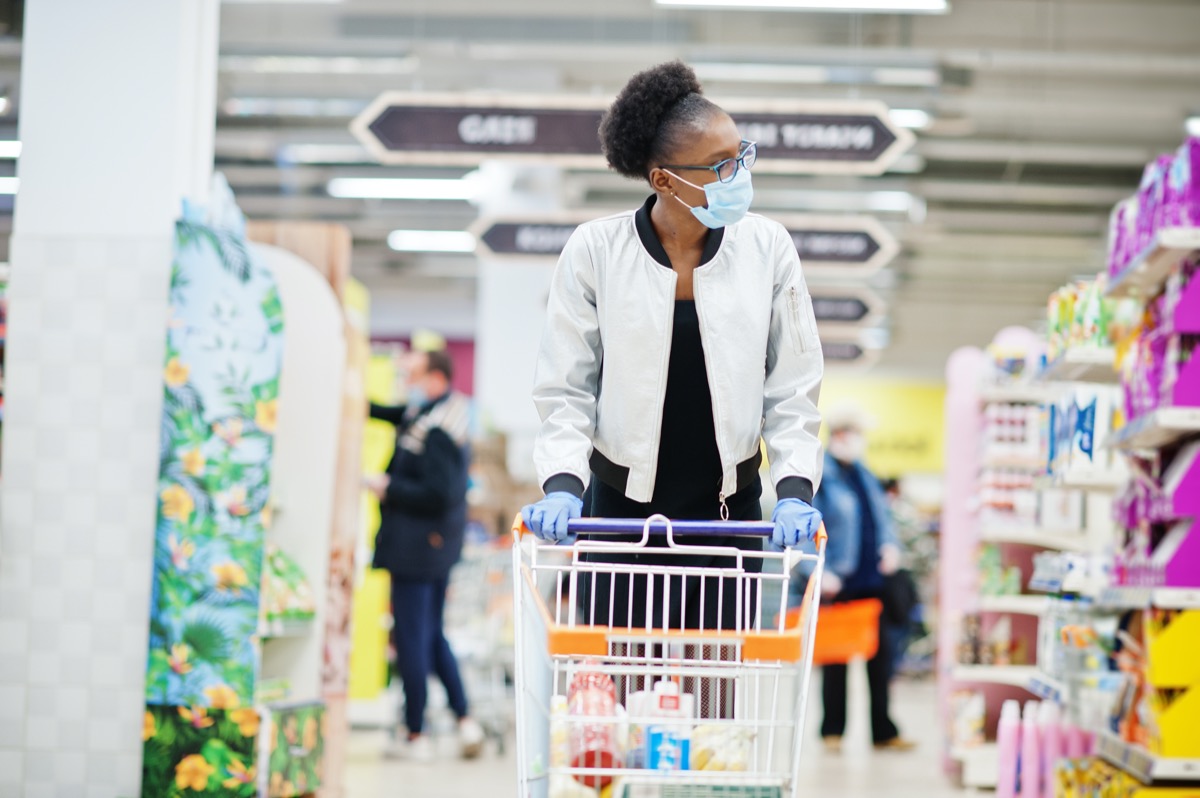This One Mistake While Grocery Shopping Skyrockets Your Coronavirus Risk

In these strange times, we've gotten used to the idea that shopping for groceries can be dangerous, with the risks of picking up COVID-19 hiding on every shelf. But as stores have taken a number of precautions to decrease the dangers, we've gotten better about mitigating our risks and become more comfortable heading to the store for fresh produce or ingredients for dinner.
But even those of us who are being extra careful may be overlooking one key mistake that can significantly increase their exposure to the coronavirus. It's not the type of groceries you buy or the specific store you go to. Rather, the biggest you can make while grocery shopping is to go to "store hopping"—visiting several stores on your shopping outing, rather than just sticking with one.
Why? Well, for one thing, it's math: every additional store you visit compounds the risks of shopping in the first place. Secondly, some of the riskiest parts of shopping are entering and exiting the store (when you are touching the door handle or waiting in line with numerous other people) and, especially, when you check out at the cashier.
"The cashier spot is still the most dangerous since every customer passes this area and stands there for some time while groceries are moving down the counter," Brandon Brown, an epidemiologist at the University of California, Riverside, told CNN.
Even if there's no line at checkout, you are still interacting with the cashier who has been in contact with dozens if not more customers throughout the day. If there is a line, you are directly breathing the air of other people who are potentially infected. And every additional store you visit multiplies these risks.
According to the latest CDC guidance, COVID-19 spreads far more easily from one person to another than it does from touching surfaces or objects. While studies have found that remnants of the virus can stick around on surfaces for hours or even days, "COVID-19 is thought to spread mainly through close contact from person-to-person," according to the organization. "It may be possible that a person can get COVID-19 by touching a surface or object that has the virus on it and then touching their own mouth, nose, or possibly their eyes [but this] is not thought to be the main way the virus spreads."
So that means that your biggest danger while grocery shopping comes at the checkout counter. Spending more time in a single store might mean that you're interacting with more products and touching more surfaces, but if it means just one checkout experience (or better yet, one self-checkout experience), you will be reducing your risks compared to if you visit multiple stores and put yourself in the position of standing in multiple lines.
Potentially more dangerous is the effect that visiting multiple stores can have on your resolve.
Social distancing, mask-wearing, hand sanitizing, and all the other habits we've had to practice in the last few weeks still require a lot of attention on our parts and don't come naturally to most. It takes focus and effort to maintain these COVID-safe behaviors. And as plenty of research has shown, our reserve of focus depletes over time—and that a loss of these focus can result in accidents.
As this summary of relevant research by the American Psychological Association puts it, "[A] growing body of research shows that resisting repeated temptations takes a mental toll. Some experts liken willpower to a muscle that can get fatigued from overuse."
While the APA article points to examples such as eating a salad instead of a burger or resisting the urge to surf the web, you could easily include the various social-distancing habits that require our resolve. And the more we tap into the reserve, going from one store to another and another, the more likely we are to start letting things slip.
Instead of store surfing, going from one place to the next, draining your will power and opening yourself up to a wide range of risks multiple times, choose your mission carefully and keep it limited.
"[After all, t]his is not the time to do impulse shopping," as June McKoy, M.D., associate professor of medicine at Northwestern Medicine, explained to AARP. "Make your list and go in like a Marine goes in: Parachute in, do your business, parachute out."
And for some helpful advice while dining out, know that This Is the Most Dangerous Place to Sit in a Restaurant After Coronavirus.








